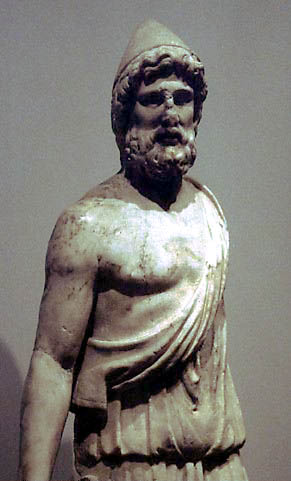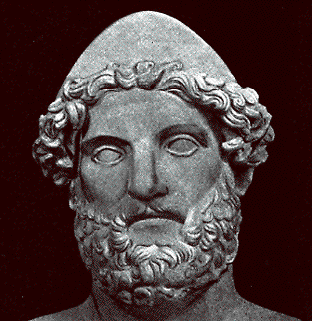mythology Hephaestus


http://home.student.uu.se/supa4836/images/hephaestus.jpg
Hephaestus
Hephaestus (IPA pronunciation: [hɪfiːstəs] or [hɪfεstəs]; Greek Ἥφαιστος Hêphaistos) was the Greek god whose approximate Roman equivalent is Vulcan; he is the god of technology including, specifically blacksmiths, craftsmen, artisans, sculptors, metals and metallurgy, and fire. He was worshiped in all the manufacturing and industrial centers of Greece, especially Athens.
Though his forge traditionally lay in the heart of Lemnos, Hephaestus was quickly identified by Greek colonists in southern Italy with the volcano gods Adranus of Mount Etna and Vulcanus of the Lipara islands, and his forge moved here by the poets. The first-century sage Apollonius of Tyana is said to have observed, "there are many other mountains all over the earth that are on fire, and yet we should never be done with it if we assigned to them giants and gods like Hephaestus" (Life of Apollonius of Tyana, book v.16).

http://www.xenatrek.de/images/hephaestus.gif
Family
Hephaestus and his brother Ares are sons of Hera, with or without the cooperation of Zeus. In classic and late interpretations, Hera bore him alone, in jealousy for Zeus's solo birth of Athena, but as Hera is older than Zeus in terms of human history, the myth may be an inversion. Indeed, in some versions of Athena's birth, the goddess only enters the world after Zeus' head is split open by a hammer-wielding Hephaestus. Either way, in Greek thought, the fates of the goddess of wisdom and war (Athena) and the god of the forge that makes the weapons of war were linked. In Attica, Hephaestus and Athena Ergane (Athena as patroness of craftsmen and artisans), were honored at a festival called Chalceia on the thirtieth day of Pyanepsion. Hephaestus crafted much of Athena's weaponry, along with those of the rest of the gods and even of a few mortals who received their special favor.
Hephaestus's craft
Hephaestus also crafted much of the other magnificent equipment of the gods, and almost any finely-wrought metalwork imbued with powers that appears in Greek myth is said to have been forged by Hephaestus: Hermes's winged helmet and sandals, the Aegis breastplate, Aphrodite's famed girdle, Agamemnon's staff of office - its provenance recounted in Iliad II - Achilles's armor, Heracles's bronze clappers, Helios's chariot, the shoulder of Pelops, Eros's bow and arrows and Hades's helmet of invisibility. Hephaestus worked with the help of the chthonic Cyclopes, his assistants in the forge. He also built automatons of metal to work for him. He gave to blinded Orion his apprentice Cedalion as a guide. In one version of the myth, Prometheus stole the fire that he gave to man from Hephaestus's forge. Hephaestus also created the gift that the gods gave man, the woman Pandora and her box.
In Iliad i.590, Zeus threw Hephaestus from Olympus because he released his mother Hera who was suspended by a golden chain between earth and sky, after an argument she had with Zeus. Hephaestus fell for nine days and nights before landing on the island of Lemnos where he grew to be a master craftsman and was allowed back into Olympus when his ability and usefulness became known to the gods
![]()








